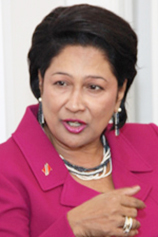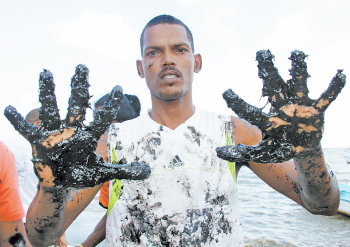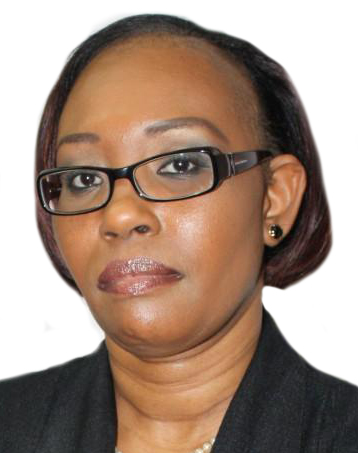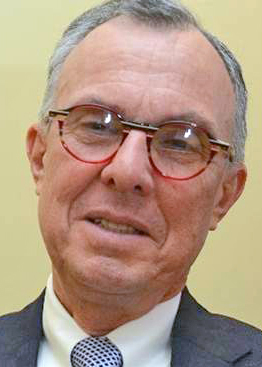Trinidad & Tobago
Blame, but forgive me

Port-of-Spain – Leader of the Opposition Kamla Persad-Bissessar last week took the fall for the now contentious property tax being introduced by the PNM government.
“I take the blame, and forgive me”, Persad-Bissessar said, adding she would take the fall for not repealing the law as it related to implementation of the Property Tax Act during her tenure as prime minister.
“I don't want to blame people today to say who did and didn't do, or why and how and where – that’s why we are in Opposition. If you have to forgive me, I take the blame, and forgive me as the leader of that Cabinet,” she declared.
Persad-Bissessar explained: “We brought two bills to Parliament during my time to repeal the act. What we did do in 2015, we passed Act Two of 2015, which was to insert a new Section 52 and 53A into the act. That was all we were able to do… That's why for five years, you didn't pay."
She added: “But we ensured that while we were there, the act was never implemented and you never paid. We validated that by making sure that we were able to pass the new Section 52. We said that should we form the government, this tax will be eradicated. We worked very hard on getting it there. It's not just a simple thing to do. I wished to blame no one person. We did take care of you for five years there, and should we get another five years, we will take care of you again.”
Calling the much vilified property tax a “Poverty Tax”, she said it has a compliance deadline of May 22, and will have an avalanche effect on consumer products.
According to Persad-Bissessar, the government rushed the legislation on the Property Tax Act and the Land Valuation Act as amended in 2009. She also questioned why the government wants citizens to suffer more economic pressure.
Persad-Bissessar noted in law there is nothing requiring someone to send a photograph of their house, or the other documents, to government officials as listed on the tax form.
However, when an assessor visits a property, the resident has no power to stop an assessment.
Persad-Bissessar said there is an issue with this, and questioned the authenticity of the person coming to act on behalf of the government. She warned that any person can enter the resident's compound with merely a letter from the Ministry of Finance, and this poses a safety and security threat, given the rise in criminal activity.
Persad-Bissessar also said pensioners are not exempted from paying property tax, but rather the accurate term is "deferred".
“This tax is not based on how much money you are making but based on the value of the property. So a pensioner who has built up (a house), they say it is deferred. And what this means now, they defer it for a while, and when that person passes away and leaves it for son and daughter, what happens? They coming for you, and you are no pensioner so you cannot get a deferral, and if you cannot pay it, they will walk into your house and pick up anything in your house," she said.
Persad-Bissessar also fielded questions from the audience who wanted clarity and legal advice on the property tax. One person asked if there were consequences to preventing the officials from coming onto private property.
The Opposition Leader responded in the affirmative, adding State officials were within the law to enter such premises.
In response to a question about squatters' rights, Persad-Bissessar explained that squatters on State lands would be exempted from the property tax. However, she said squatters on private lands would have to pay the tax on their structures.
Meanwhile, Finance Minister Colm Imbert has declared as a property owner he too must pay the property tax. At the time, he was rejecting claims by the Opposition the tax was unconstitutional; that criminals were posing as property valuators; that people are in imminent danger of losing their homes, and public servants had sabotaged plans by the PP government to repeal the Property Tax Act.
Said Imbert: “I know people don’t like property tax. I and all vex with mehself because I have to pay. I don’t like it but this country is in a very difficult position and we need everybody to contribute to the revenues of the country. Things are tough. We have to look for alternative sources of financing.” Trinidad and Tobago is facing a (TT) $20 billion gap in financing.
Stating the government will do all it can to make it “as easy as possible for people”, Imbert said the Property Tax Act allows for persons in an impoverished condition to apply for a deferral.
“I am looking at that to see whether we should convert that deferral into a complete waiver,” he stated.
On concerns about a (TT) $500 penalty if documents are not submitted to the Ministry by May 22, Imbert said, “The Minister of Finance is not going to fine anybody. Neither is the Commissioner of Valuations.” He explained the current exercise which requests property owners to file a return of their properties “flows from the Valuation of Land Act and not the Property Tax Act”.
Last week the Chamber of Industry and Commerce has said it wants the government to provide clarity on the property tax, even as it questioned whether measures are being put in place for pensioners and the most vulnerable in society.
It also expressed concern over the effect this tax might have on businesses.
The chamber pointed out with the global decline in the price of oil and gas it was fully cognisant of the need for the government to find alternative sources of revenue. While there was also no issue with the reimplementation of the tax, the chamber said it has challenged the government to be clear and transparent on the process.
“We were adamant then, as we are now, that any measure put in place should not result in the de-incentivisation of the private sector,” it said.

“Whenever these things happen, customers stay away. They do not want to buy anything because they are afraid the fish is unsafe. It is bad for us because we lose out and no one pays us any compensation for our loss of earnings,” fisherman Sunil Supersad said. He operates at the Otaheite Fishing Depot at Bay Road in South Oropouche. He believes because of the direction of the winds and currents at sea, the fuel did not wash ashore at Otaheite. Instead, it made its way to the south-western peninsula.
“It is 35 years now I am in this business. Our men went out to fish at Point (Fortin) this morning and spotted oil in the water. We want to know what chemicals Petrotrin is using to clean it and what effect it will have on the fish,” he said.
Petrotrin estimated that 300 barrels of the fuel entered the Gulf of Paria following the leak. Since the discovery, officials from the Ministry of Energy and Energy Industries, Environmental Management Authority and the Institute of Marine Affairs together with other bodies engaged in clean-up activities.
Petrotrin said aerial and marine surveys revealed the oil was moving in a west north-westerly direction.
There were also reports of oil in the Guaracara River in south Trinidad. However, the company said the spill occurred in the port of Pointe-a- Pierre, which is northwest of that river.
According to the Ministry’s head of corporate communications Rory Subiah, the ministry employed the Incident Management System to manage the spill in coordination with Petrotrin and other government agencies. This was in accordance with the National Oil Spill Contingency Plan, Subiah said.

Ayers-Caesar's resignation was closely followed by an immediate response from Archie. In his statement, Archie noted it was customary for successful candidates to the High Court bench to ensure the fulfilment of all previous obligations before declaring themselves available.
He also indicated Ayers-Caesar would return to the magistracy to finish her work.
Ayers-Caesar's appointment resulted in a bloody fracas last Wednesday in the cellblock area of the Eighth Court in Port-of-Spain. Then some prisoners awaiting trial before her became enraged on hearing their matters would be further delayed due to her elevation to the High Court.
The melee left several prisoners, and the police officers with whom they had faced off, in need of medical attention.
Ayers-Caesar received her instrument of appointment on April 12 from President Anthony Carmona. On April 19, the Judiciary issued a statement addressing rumblings about a void left in the system by the promotion of Ayers-Caesar, saying her departure would not negatively affect the lower court.
At the time, court and protocol information officer Alicia Carter-Fisher, said what was before Ayers-Caesar were "paper committals".
In the statement last week on her decision to resign, Ayers-Caesar said she acknowledged concerns raised with respect to the various matters not completed before her as chief magistrate by the time of her appointment to the bench of the Supreme Court of Justice.
Ayers-Caesar said she recognised "the effect that the failure to complete these matters will invariably have on the stakeholders in the criminal justice system, including accused persons, victims of crime and members of the legal profession".
She added: "Upon mature reflection, I am of the considered view that it would have been preferable that I advise the Judicial and Legal Service Commission of the full state of my list and request further time to bring matters to completion before confirming my readiness to assume duties as a judge of the Supreme Court.”
Ayers-Caesar also said after "careful deliberation, prayer and consultation" with her family, she sought an audience with Archie, following which she delivered her letter of resignation as a judge of the Supreme Court to President Anthony Carmona.
"I continue to regret the effect which my actions have caused on the very persons whom I strive to serve, and thank His Excellency the President and the Honourable Chief Justice for the confidence placed in me," she said.
Archie said he noted while she had been selected for elevation to the High Court following a robust process by the Judicial and Legal Service Commission, Ayers-Caesar had "failed to manage the transition from the magistracy to the High Court in a way which ensured that undue hardship was not placed on stakeholders".
Archie said he also noted Ayers-Caesar "departed from established practice whereby successful candidates ensured they have fulfilled all outstanding professional obligations before advising the commission of their availability for appointment to the High Court".
He added: "The Chief Justice and the JLSC were not made aware of the full extent of her obligation before the Lower Court before His Excellency fixed the date for the swearing in of Mrs Ayers-Caesar. The Chief Justice is however fortified in Mrs Ayers-Caesar's renewed commitment to place her duty and responsibility to the administration of justice ahead of personal interests, and has noted her willingness to attend to those matters which were pending before her in the magistrates' courts.”
Archie said given Ayers-Caesar's commitment to addressing her outstanding matters and having regard to the hardships likely to be experienced by accused persons, witnesses and the legal fraternity should matters be restarted, the JLSC has met and agreed to restore her to the Magisterial Bench.
Archie urged members of the legal profession and other stakeholders in the criminal justice system to continue to render the support needed to ensure the efficient disposition of matters in the criminal justice system.
Prime Minister
Rowley gave this undertaking in the Vision 2030 document which was laid in the House of Representatives last week by Planning and Development Minister Camille Robinson-Regis.
“We recognise that, as a nation, we face several challenges,” he said. He also noted some of these challenges are triggered by global events “beyond our control, with consequential ripple effects at the national level.”
Against this background, Rowley said, “As citizens, we must all appreciate that circumstances which we now face require sacrifice and managed adjustment in our living standards, for a period of time, until our economy is successfully stabilised.” He also noted the government is committed “to those of our citizens who are unable to cope effectively with the more difficult circumstances”, adding measures have been put in place “to cushion the landing of the vulnerable groups in society, who would be most challenged by the downturn in economic activity”.
In giving the assurance the government “is clear about what needs to be done”, Rowley said Vision 2030 contains a detailed, comprehensive, wide-ranging and broad-based suite of detailed policy initiatives and measures developed to place the country on the road to recovery and stability.
Promising the government will have frequent community and sectoral conversations on the many areas of national interest outlined in Vision 2030, the Prime Minister said his administration’s approach to governance will be evidence-driven while paying attention to the need for compassion, sensitivity, environmental responsibility and respect for the rights of all citizens in matters of state. Vision 2030 lists “solving and preventing crime” among the key challenges facing Trinidad and Tobago.
Specifically, the document notes the country has been plagued by “unacceptably high rates of serious crimes, particularly murders,” for the last 20 years. Most murders are classified as being related to gang violence connected to the movement of drugs and the associated acquisition of guns.
The document further notes the inadequate policing response to deal with crime and the rapid growth in the private security industry, as well as citizens and businesses attempting to protect their lives and property.
It adds the criminal justice system has not adjusted to the challenge of rising crime, with resource inadequacies afflicting the Office of the Director of Public Prosecutions, the Forensic Science Centre, the system of preliminary inquiries, the number of judges assigned to the criminal bench, and overcrowding in the prison system.
Persad-Bissessar said the forms were deemed null and void, and no charges can be laid against property owners who fail to submit.
She was addressing supporters at a political meeting in Debe following a motorcade through UNC-held constituencies in South Trinidad.
"I am a lawyer and I have consulted with other lawyers. We have gone through the Valuation Land Act, we have gone through the Property Tax Act and it is very clear that this form is null and void. And today I tell you, you have no obligation in law to fill up this form and send it in. And I will show you what to do with this form. There is nothing in the law, they cannot prosecute you, they can do you nothing, do this. And if they come to lock you up, let them lock me up first," she said.
Persad-Bissessar said citizens were encouraging strangers into their homes by submitting to filling out the form. She said once a form is submitted persons would be dispatched to assess properties.
"You have your wife and your children at home. You working your life off and they want to send a stranger into your house to see what you have inside. In this time of crime, the worst-ever in our history, you want to tell us somebody coming inside your house. When you send a form they will come in your house. They will know who you are, they will know your address, they will know where to find you," she said.
Persad-Bissessar gave the assurance should the UNC return to government no property tax would be imposed on citizens. She added the implementation of property tax would create a ripple effect, ranging from an increase in Water and Sewerage Authority bills to rent.
Persad-Bissessar told supporters homeowners with small businesses would now be upgraded to commercial homes and made to pay higher taxes.
"When you see they assess your property and the value will be higher, WASA rate gone up instantly. Other things will be increased as well indirectly because if it is you are paying a rent the landlord will have to make back some money, he passes it down to the tenant. When the manufacturer and the businessmen selling you water, flour, sugar and whatever they have to pay commercial property tax, prices will go up. So all the prices will go up in the country," she said.
Persad-Bissessar called on citizens to band together and fight. She also gave the assurance that the UNC will do everything possible as members of Parliament. She said they would fight in the Parliament, in the courthouse and on the streets.
Oropouche East MP Dr Roodal Moonilal said he was prepared to be arrested and charged with not submitting his return. He said no one should be given permission to enter a person's private property to assess their belongings.
"Come May 22, Roodal Moonilal is not submitting one damn form to this Government and I tell them arrest me, name me as defendant number one, charge me, but we are submitting nothing," Moonilal said.
He added the UNC has been granted approval by thousands of citizens to protest against the property tax in Trinidad and Tobago.

The University Council gave the all-clear for Bermudez to take up the appointment at its annual business meeting in Barbados.
He will assume duties on July 16, one day after Sir Alleyne demits office.
Bermudez is the second Trinidadian to hold this position, the first being Dr Eric Williams. He is chairman of the board of directors of the Bermudez Group of Companies. He will serve a seven-year term and can be re-appointed only once.
Earlier this month, at a post-Cabinet news briefing, Education Minister Anthony Garcia revealed Bermudez had been chosen for the post, although the appointment was not yet cleared by the council.
In a following statement UWI expressed surprise at the announcement. Garcia defended his actions, saying he was directed by Cabinet to make the announcement.
"In fact it was the feeling of Cabinet that at this point it was safe and prudent to make such a statement," he said.
Neither Sir George nor UWI Vice Chancellor Prof Sir Hilary Beckles commented on the minister's faux pas last week. However, both confirmed the council had accepted the nomination based on advice of the search committee, chaired by Sir Hilary.
The Vice Chancellor defended the process and the work of the council, saying it went about its business in a very robust fashion and followed the applicable rules and regulations.
"My task, as chairman of that search committee, was to satisfy council that the process was adhered to in terms of our statutes, that the procedures of that committee were consistent with the rules and regulations and the remit of council. We reported on the occasions in which we met and how we proceeded, the nature of our choice and decision-making and how we were able to bring that conversation to council for its decision. That process and our judgment was flawless," Sir Hilary said.
He added: "What happens on the margins of all of that is not really relevant to us. What is important was that we are moving according to the standards set."
Bermudez’s business background sees him serving as the chairman of the board at Bermudez Group of Companies. He has been the non-executive chairman of Neal and Massy Holdings Ltd since July 18, 2014, and served as deputy chairman of Neal and Massy Holdings Ltd from February 1, 2013 to July 18, 2014.
He has been a director of Neal and Massy Holdings Ltd since 1997. He also served as a director at RBC Financial (Caribbean) Ltd.
